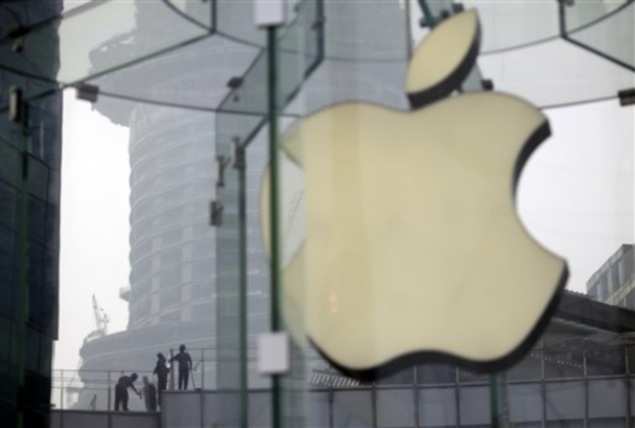
Apple's blockbuster revenue growth is slowing drastically, as iPhone sales plateau and the company finds itself lacking revolutionary new products.
The company's warning, issued Wednesday as part of its financial results for the holiday quarter, sent Apple Inc.'s stock plunging by more than 10 percent, wiping out a year's worth of gains.
Analysts said the warning suggested Apple can no longer sustain its growth without some completely new products. Its last revolutionary creation, the iPad, was launched in 2010. Co-founder Steve Jobs, who was the engine behind the creation of the iPod, iPhone and iPad, died in 2011.
"It has been an overriding concern with Apple that they would not be able to generate revenue growth just rolling out new versions of old products," said Jeff Sica, president and chief investment officer of SICA Wealth Management. "Now they've proven it in their numbers."
On a conference call with analysts, Apple CEO Tim Cook rebutted that idea, but as usual, gave no details.
"We're working on some incredible stuff. The pipeline is chock full," he said.
Before he died in 2011, Apple co-founder Steve Jobs told biographer Walter Isaacson that he had figured out how to create a groundbreaking, easy-to-use TV set. Since then, company watchers have been waiting for the company to bring out something in that vein to re-energize sales. Cook said the company was still working on it.
"I tend to believe that there's a lot we can contribute in the space, and so we continue to pull the string and see where it leads us," he said.
Apple said it expects sales of between $41 billion and $43 billion in the current quarter, which ends in March. That would usually be little cause for concern, even though analysts were expecting $45.6 billion, because Apple usually lowballs its forecasts. But Chief Financial Officer Peter Oppenheimer said the company is changing its practices and providing a reasonable range rather than a single, easily achievable number.
That means Apple is looking at sales growth of about 7 percent from last year's January to March quarter, a striking number for a company that's posted double-digit increases in every quarter except one since 2008.
Apple's stock fell $55.58 to $458.43 in extended trading, after the release of the results. The shares are down 35 percent from their all-time high, hit Sept. 21, when the iPhone 5 launched.
Fueled by earlier versions of the iPhone, Apple's market capitalization decisively overtook that of Exxon Mobil in early 2012, making it the world's most valuable company. With Wednesday's drop, Apple is worth just 5 percent more than Exxon.
Apple's enviable profit growth also hit a wall in the October to December quarter. It said net income in the fiscal first quarter was $13.1 billion, or $13.81 per share, flat with a year ago. That still beat expectations, as analysts polled by FactSet had forecast earnings of $13.48 per share.
Revenue was $54.5 billion, up 18 percent from a year ago. Analysts were expecting $55 billion. Sales were held back by the fact that the latest quarter had 13 weeks, one less than the corresponding 2011 quarter.
Apple shipped 47.8 million iPhones in the quarter, about 1 million less than analysts were expecting, and 22.9 million iPads, also about 1 million short.
Most surprisingly, Mac sales were also 1 million short, at 4.1 million. That's a 22 percent drop from shipments a year ago. Oppenheimer said this was because Apple couldn't get the new iMac desktops out before December.
Cook said iPhone supplies were short too, and the company could have sold more of both the iPhone 5 and older iPhone 4 if it had been able to make more.
Most technology companies would be ecstatic if they posted 18 percent sales growth and $13 billion in profit for a single quarter, but Apple is held to a high standard, set by the shocking, iPhone-propelled success of the last few years.
"Apple has been growing tremendously and that level of growth can't be sustained by any company," said Sarah Rotman Epps, senior analyst at Forrester Research.
Investors have already been concerned that Apple's strategy of keeping the price of the iPhone high means it's losing out on sales, particularly overseas. Consumers are instead opting to buy cheaper smartphones running Google Inc.'s Android software, which has propelled South Korea's Samsung Electronics to the world's largest maker of smartphones. The average wholesale price of the iPhone is $640, hundreds of dollars more than smartphones with comparable hardware.
There's speculation among company watchers that the company will produce a cheaper iPhone, but that would cut into its profit margin and could tarnish the company's image as a purveyor of premium products.
Apple had warned that the holiday quarter's profits would be lower than Wall Street was initially expecting, because it had so many new products coming out, including the iPhone 5 and iPad Mini. New production lines are more expensive to run and yield more defective products that need to be redone or thrown out rather than sold.
No comments:
Post a Comment